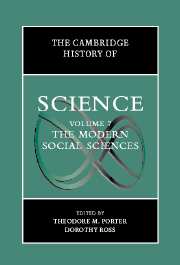Book contents
- Frontmatter
- 1 Introduction: Writing the History of Social Science
- PART I SCIENCES OF THE SOCIAL TO THE LATE NINETEENTH CENTURY
- 2 Genres and Objects of Social Inquiry, From the Enlightenment to 1890
- 3 Social Thought and Natural Science
- 4 Cause, Teleology, and Method
- 5 Utopian Socialism And Social Science
- 6 Social Surveys in the Eighteenth and Nineteenth Centuries
- 7 Scientific Ethnography and Travel, 1750–1850
- 8 History and Historicism
- 9 Bringing the Psyche into Scientific Focus
- 10 Continental Political Economy From the Physiocrats to the Marginal Revolution
- 11 British Economic Theory From Locke To Marshall
- 12 Marx and Marxism
- PART II THE DISCIPLINES IN WESTERN EUROPE AND NORTH AMERICA SINCE ABOUT 1880
- PART III THE INTERNATIONALIZATION OF THE SOCIAL SCIENCES
- PART IV SOCIAL SCIENCE AS DISCOURSE AND PRACTICE IN PUBLIC AND PRIVATE LIFE
- Index
- References
8 - History and Historicism
from PART I - SCIENCES OF THE SOCIAL TO THE LATE NINETEENTH CENTURY
Published online by Cambridge University Press: 28 March 2008
- Frontmatter
- 1 Introduction: Writing the History of Social Science
- PART I SCIENCES OF THE SOCIAL TO THE LATE NINETEENTH CENTURY
- 2 Genres and Objects of Social Inquiry, From the Enlightenment to 1890
- 3 Social Thought and Natural Science
- 4 Cause, Teleology, and Method
- 5 Utopian Socialism And Social Science
- 6 Social Surveys in the Eighteenth and Nineteenth Centuries
- 7 Scientific Ethnography and Travel, 1750–1850
- 8 History and Historicism
- 9 Bringing the Psyche into Scientific Focus
- 10 Continental Political Economy From the Physiocrats to the Marginal Revolution
- 11 British Economic Theory From Locke To Marshall
- 12 Marx and Marxism
- PART II THE DISCIPLINES IN WESTERN EUROPE AND NORTH AMERICA SINCE ABOUT 1880
- PART III THE INTERNATIONALIZATION OF THE SOCIAL SCIENCES
- PART IV SOCIAL SCIENCE AS DISCOURSE AND PRACTICE IN PUBLIC AND PRIVATE LIFE
- Index
- References
Summary
History occupies a singular position among the modern social sciences. It was the first to assume a durable professional shape. The basic canons for modern academic historiography were introduced in Germany early in the nineteenth century. By that century’s end, the model of Barthold-Georg Niebuhr and Leopold von Ranke had been widely imitated across western Europe and the United States, establishing the permanent institutional mold of the discipline. The special place of history among the social sciences involves more than mere precedence, however. For historiography was accompanied in its passage toward science by an enabling philosophy of history – or a set of such philosophies – that claimed a unique privilege for historical explanation and understanding, with consequences for the entire range of the social sciences.
It was only early in the twentieth century that these philosophies or ideologies of history were first gathered together, retrospectively, under a single rubric, that of “historicism.” Although the term was a century old, its release into wider circulation really began with Ernst Troeltsch, who used it, in the years following the First World War, to describe what he saw as the dominant outlook of the preceding century, which had emphasized the decisive place of change and development in the human realm. Contrasting it with Naturalismus, the outlook of the natural sciences, Troeltsch declared Historismus to be in “crisis,” having issued into antiscientific skepticism and relativism. A decade later, Friedrich Meinecke gave the term a slightly different inflection. Tracing its origins to Johann Gottfried von Herder and Johann Wolfgang von Goethe, Meinecke saw their stress on the concrete, the unique, and the individual as the core of historicism.
- Type
- Chapter
- Information
- The Cambridge History of Science , pp. 113 - 130Publisher: Cambridge University PressPrint publication year: 2003
References
- 4
- Cited by



